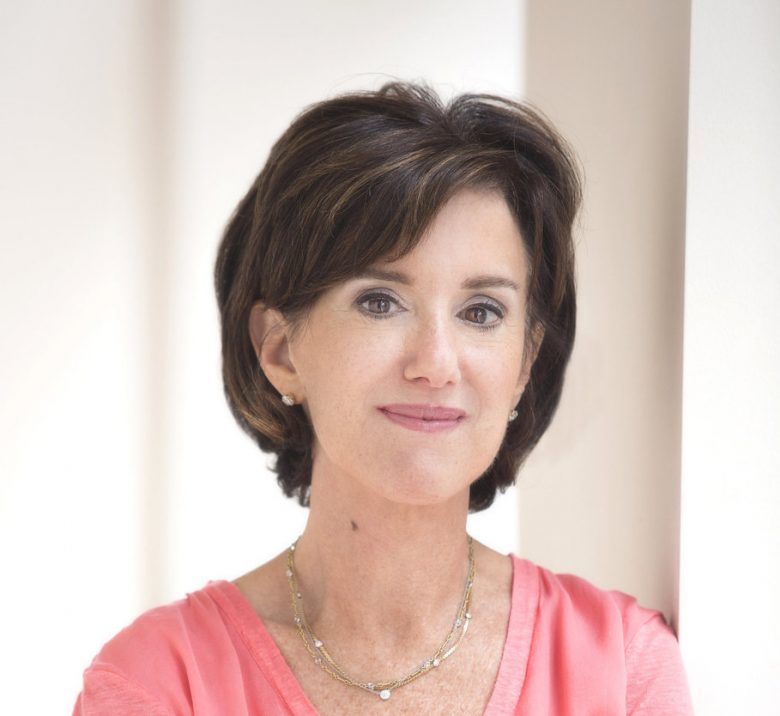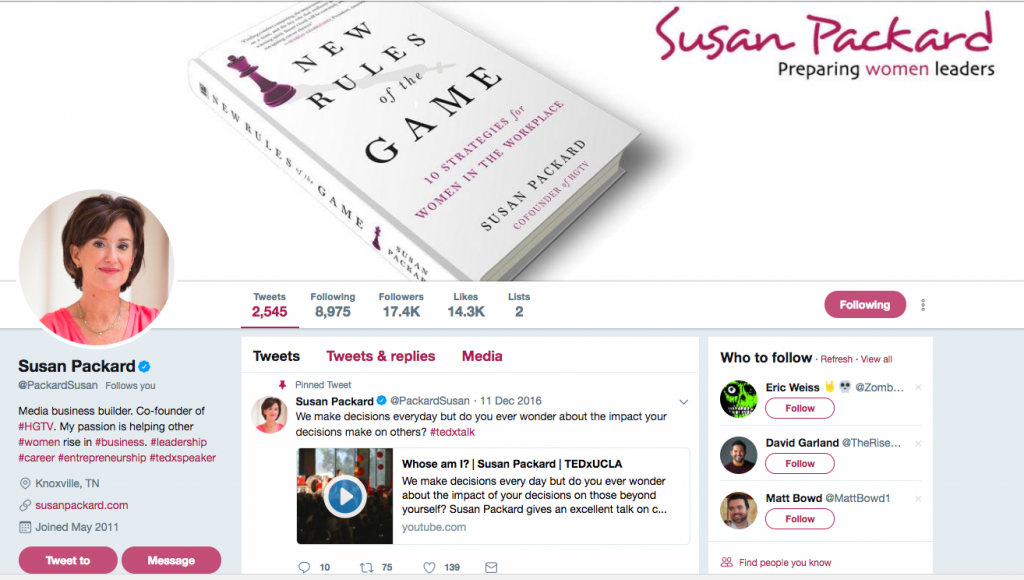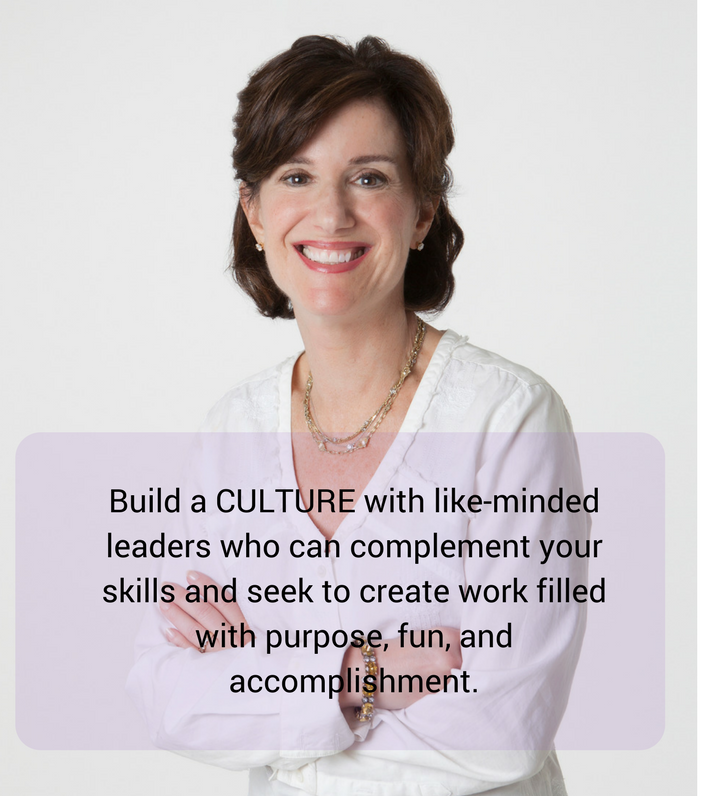Lovers of cable television and home renovation probably can’t image a world without “Flip Flop”, “Property Brothers” and “Love it or List it”. Fans of those shows, as well as many others, can thank Susan Packard and Scripps Networks Interactive for helping HGTV become the television giant that it has become. Susan helped to build powerhouse media brands like HBO, CNBC, and HGTV. She was the co-founder of Scripps Networks Interactive and former chief operating officer of HGTV.
HGTV reaches over 95,628,000 American households. In 2016, HGTV overtook CNN as the third most-watched cable channel in the United States, behind Fox News and ESPN. Packard helped to build Scripps Networks Interactive to a market value of over $10 billion.
We had the opportunity to ask Susan a few questions about her background, her book “New Rules of the Game: 10 strategies for women in the workplace”, and what it was like building major media brands from scratch. Her answers were super insightful.
After reading the interview, don’t forget to follow Susan on Twitter.
Q. Welcome to StartUp Mindset, Susan. We’re really excited to have you. For the readers who are not familiar with you, could you tell us a little about yourself and your background?
I’ve worked in media for most of my career, helping to start up programming networks like CNBC and HGTV. More recently I’ve been writing books, speaking and coaching.
Q. You were Intrapreneur while working with Scripps. How was your role in the company different than traditional entrepreneurship?
I had the best of both the corporate and entrepreneurial worlds, because we were starting a business from scratch, but we didn’t have to go out and raise money from VC partners. Our corporate parent provided the initial funding. To me, finding an opportunity to be an intrapreneur is great training for going out on your own.
Q. Vying for the attention of the general public is very difficult. You and your team definitely had your work cut out for you. What strategy did you and your team focus on when trying to grow HGTV?
A couple of things were key. We used partners wherever we could, which can be hard to do when you have a strong vision and want it to stay uncompromised. But the business landscape is so vast today, it’s hard to break thru and strategic partners help.
We used one of our charter advertisers, Lowes Home Improvement stores, to help us market our television brand, and in return offered smokin’ rates for advertising. The other key thing I’d mention is staying close to your customers at all times, hearing from them constantly, checking in with them. We did this initially through a small call center, which morphed to mostly online communication. We’ve never let up on staying connected to them.
Also, never forget the A, B, C’s of building a successful business.
ANALYZE your market, its potential, your customers and competition.
Create a BRAND or ways your idea will stand out and be remembered.
Build a CULTURE with like-minded leaders who can complement your skills, and seek to create work filled with purpose, fun, and accomplishment.
Q. What was one of the biggest challenges you faced when launching the network?
We chose Knoxville, Tennessee, as home to the network, and it was hard getting young media professionals there. They were mostly living in the large urban media markets, like NY and LA. We had to prove we had staying power as a business, and once we did, it was easier to recruit strong talent.
Q Is there a major leadership lesson that you learned during your time as Chief Operations Officer that you wish you could share with every COO?
Yes, it doesn’t matter your title, you exist within a team, not in some isolated place above them. I came into HGTV as EVP, and about a year later was promoted to COO. In this new role, there were a few more decisions for me to make, but our team structure didn’t change.
For example, we had weekly meetings and sometimes others would run them, not just me. The moment you see yourself as standing above your team, the job has become an ego trip. Leaders stand in solidarity, on shared ground, with their teammates.
Q.With digital media becoming as powerful as it has become, most startups, in a sense, must become mini-media companies when it comes to marketing. What advice would you give entrepreneurs about using media content to capture people’s attention, keep them entertained, and selling to their audience?
I would say first, use all available platforms to communicate, and 2nd, the platform matters less than the relationship with your viewers/users—know how they live their lives, what’s important to them, how their lives may be changing. Talk to them all the time.
Q. Tell us a little about your book New Rules of the Game: 10 Strategies for Women in the Workplace and why you decided to write it.
A friend of mine, who’d written several business books, suggested I write the story of my career because she thought it might be interesting. I sat back them reflected on why I’d made it to senior roles. Then I took those ideas, the “10 rules, ”or strategies, and went out and spoke to a dozen other CEOs to either corroborate the rules, or shoot them down. I found remarkable similarities in their stories and mine, so I went on to write the book, which is a composite of strategies for navigating your workplace successfully, and advancing.
Q. Growing a business can get pretty crazy. In your blog, you spoke about a practice called ‘going to Abilene.’ Can you tell us a little more about what that means and how it can help entrepreneurs during the crazy times?
Oh, “going to Abilene” is one of my favorite stories to tell. When you’re in the frantic pace of work and meetings with others to accomplish things, sometimes harsh words can be exchanged. I’ve been told I’m very direct, so I’ve worked hard to not rush my words.
At HGTV, we used safe language to call one another out when one of us went afield of our goal or was in digression mode. We’d say “I think you’re going to Abilene” and that helped us to reframe. Especially with strategy issues.
We called ourselves out on these behaviors too. There were brainstorms when I’d be on another planet, in dreamer mode, and all I had to do was look around and know. I’d say, “I get it. I’ve gone to Abilene on that one.”
Q. What exciting projects are you involved in these days?
I’m finishing up my newest book, which is about a new way to look at emotional intelligence, which is the human side of work life. It’s been sheer pleasure to write this one. I just returned from Pittsburgh to speak to a leadership group about New Rules, and this week I head out on a coaching assignment. My life is rich and full, and I feel grateful for that.
Q. What advice would you give an entrepreneur or intrapreneur that is pursuing a big idea but may be having trouble making that idea work?
A few weeks back I sat with a young woman who was trying to get her idea off the ground. She was frustrated by how slow her progress was, but she lit up when discussing what she had already accomplished. She asked, “Do you think I should stick with this?” I told her I didn’t see any way she wouldn’t stick with her idea, given the passion she expressed for it. She just needed to voice some fear of the unknown, which we all have.
In times like those, remember how you felt when you first started. Remember your excitement to bring this idea to life! Count to 10. Find a friend or someone you trust to consult with when you hit a snag. And don’t forget the A,B,C’s. May your dream come true!
To learn more about Susan and her book, you can visit her website here.
















Pingback: "SOCIAL INFLUENCE" Sample Chapter-"How we earned our first 100,000 followers on Social Media" - StartUp Mindset